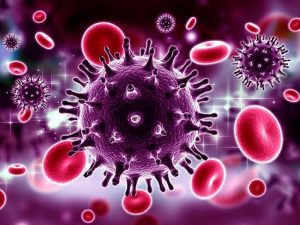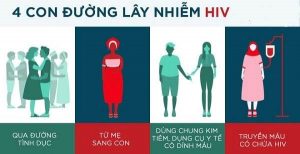Propaganda on HIV/AIDS prevention among students
NTTU – HIV/AIDS is a dangerous disease, so far there is no treatment or vaccine to prevent it and is a threat to human life, health and the future of nations. More worrying is that HIV/AIDS is spreading strongly in all regions from urban to rural areas, from mountainous areas to remote islands of the country as well as around the world while people are increasingly reduce vigilance with this dangerous disease.

HIV detection in blood cells
And according to forecasts, if we do not take effective measures to prevent, by 2023, the number of people infected with HIV/AIDS may increase dramatically. Even in Vietnam, every day that goes by, more people have to live with this century’s disease. More tragic is that many of them including children and the elderly have unknowingly contracted the disease because they have no option to prevent the infection.
The age group most susceptible to HIV/AIDS is the new students, because they have just escaped from the strict control of their families to enter a new environment with many temptations, plus the fact that they are in their youth in love and understanding is very limited. Recognizing the importance of equipping students with knowledge of HIV/AIDS prevention, the Faculty of Pharmacy – bet365 soccer Bấm để vào trang web chính thức has actively created many information channels to provide more knowledge about HIV/AIDS to help students learn more about HIV/AIDS, help students better understand and can prevent this disease of the century. Many measures have been taken such as communication from the University, the Dean of Faculty, each lecturer in class activities, through social networks, through each lecture in the lecture hall… Meaningful actions This also contributes to increasing the family’s trust in the university, increasing more choices for families to safely send their children to bet365 soccer Bấm để vào trang web chính thức to study and practice.
I- HIV/AIDS
HIV is an abbreviation for Human Immunodeficiency Virus. AIDS stands for acquired immune deficiency syndrome. AIDS is the final stage of HIV infection.
II- SYMPTOM
04 phases for HIV infection
- Primary infection stage: lasts from 2 to 6 months, the body is completely normal. HIV test results negative (so during this period it is easy to pass the infection on to others if you have unprotected sex).
- Asymptomatic HIV infection period: from 5 to 7 years, the body is still healthy and normal, the test results are positive.
- Near AIDS stage: still no specific symptoms, test results are positive.
- AIDS stage: infected people often have typical symptoms:
– Loss of weight (loss of more than 10% of body weight)
– Fever, diarrhea, cough lasting more than 1 month
– Occurrence of many diseases such as cancer, pneumonia, tuberculosis, dermatitis, body sores
– Patients quickly die depending on care and treatment conditions
III- PARTHWAYS FOR HIV INFECTION

- Sex: is the most common route of infection among young people in general and students in particular. If they are not provided with adequate knowledge, unpredictable consequences are likely to occur. The HIV virus is found in abundance in the genital fluid of an infected person. As a result, the HIV virus can enter the partner’s bloodstream through the genitals. Sexual activity, whether it’s intercourse or just contact with the genitals, is contagious.
- Mother-to-child: The percentage of children born with HIV to mothers infected with HIV is 25–30%. HIV can be passed from mother to baby through the placenta while the baby is in the womb, through the mother’s blood and fluids at birth, or through breast milk while the baby is breastfeeding. Newborns infected with HIV usually do not live more than 3 years.
- Sharing needles and medical equipment with blood on it: HIV is present a lot in the blood of an infected person, so sharing needles and medical equipment with people living with HIV will have a very high risk of infection. In the case of drugs alone, it does not cause HIV by itself, but drug addicts can easily get HIV because of sharing needles with addicts or needles at drug stores.
- Blood transfusion of HIV-infected people: According to the announcement, HIV transmission through blood transfusion is possible but very rare, and occurs only when blood donors infected with HIV virus are in the window period, HIV is undetectable at the time of blood donation.
IV- PREVENTION
Depending on the route of HIV transmission, the following preventive measures are available:
- Prevention of sexually transmitted HIV/AIDS:
– Do not have unprotected sex., live a healthy life, be faithful to monogamy and both of you are not infected with HIV.
– In the case of sex with an unknown person infected with HIV, it is necessary to practice safe sex to protect yourself by using a condom correctly, reducing the risk by about 80%. long-term HIV transmission.
– Early detection and prompt treatment of sexually transmitted diseases also help reduce the risk of HIV/AIDS transmission because the damage caused by STIs will be the ideal entryway for HIV
- Prevention of HIV/AIDS infection through blood:
– Do not inject drugs.
– Only transfuse blood and blood products when absolutely necessary, receive only blood and blood products tested for HIV.
– Use only sterile needles and syringes. Do not share syringes. Use sterilized instruments for surgery, tattooing, piercing, acupuncture, etc.
– Avoid direct contact with body fluids of HIV-infected people
– Separate personal belongings: razors, toothbrushes, manicure/pedicure tools.
- Prevention of HIV/AIDS transmission from mother to child:
– A woman infected with HIV should not become pregnant because the rate of HIV transmission to her child is 30%, if she is pregnant, she should not give birth.
– If you want to have a baby, you need to go to a health facility for advice on how to prevent HIV transmission to your baby.
- Blood test if suspected possible infection
If you suspect you have HIV, you should get a blood test immediately to know for sure how far you have been infected. Because without HIV medicine, people with AIDS usually live about 3 years. Once someone has contracted the disease, it is very dangerous, as the survival time can be reduced to about 1 year. That’s also why HIV testing is so important.
Department of International Relations





